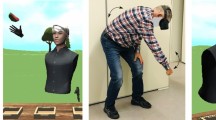Abstract
Virtual reality (VR) can provide compelling experiences which might enhance users’ engagement with physical activity. Despite the known health benefits of exergaming, there is a limited understanding of how various game designs impact user experience. This work proposes VR Rides, a virtual reality exergaming platform that combines a recumbent tricycle, real-world panoramic images, an Oculus Rift headset and a Microsoft Kinect camera, where the player can navigate real locations in a safe virtual environment. We further compare two game designs: a competitive guessing game and affiliative tour. This pilot study with both young and older adults indicates that task enjoyment (r = 0.721, p = 0.000), motivation (r = 0.565, p = 0.009) and connectedness (r = 0.697, p = 0.001) is higher in the competitive variant. Participants in both variants were highly engaged, likely due to the use of immersive VR. Descriptive analysis suggests that participants showed similar connectedness in affiliative tour (63 %) and competitive design (62 %).
Access this chapter
Tax calculation will be finalised at checkout
Purchases are for personal use only
Similar content being viewed by others
References
World Health Organization, Physical activity (2016). http://www.who.int/topics/physical_activity/en/
Zakzanis, K.K., Quintin, G., Graham, S.J., Mraz, R.: Age and dementia related differences in spatial navigation within an immersive virtual environment. Med. Sci. Monit. 15, CR140–CR150 (2009)
World Health Organization, Obesity and overweight (2015). http://www.who.int/mediacentre/factsheets/fs311/en/
Osorio, G., Moffat, D.C., Sykes, J.: Exergaming, exercise, and gaming: sharing motivations. GAMES Heal. Res. Dev. Clin. Appl. 1, 205–210 (2012)
Nintendo Wii Sports, 19 November 2006. http://www.nintendo.com/games/detail/1OTtO06SP7M52gi5m8pD6CnahbW8CzxE
Anderson-Hanley, C., Arciero, P.J., Brickman, A.M., Nimon, J.P., Okuma, N., Westen, S.C., Merz, M.E., Pence, B.D., Woods, J.A., Kramer, A.F., Zimmerman, E.A.: Exergaming and older adult cognition: a cluster randomized clinical trial. Am. J. Prev. Med. 42, 109–119 (2012)
Lieberman, D.A.: Dance Games and Other Exergames: What the Research Says (2006). www.comm.ucsb.edu/faculty/lieberman/exergames.htm
Gerling, K., Livingston, I., Nacke, L., Mandryk, R.: Full-body motion-based game interaction for older adults. In: Proceedings of 2012 ACM Annual Conference on Human Factors Computer System, CHI 2012, pp. 1873–1882 (2012)
Tan, C.T., Leong, T.W., Shen, S., Dubravs, C., Si, C.: Exploring gameplay experiences on the oculus rift. In: Proceedings of the 2015 Annual Symposium on Computer-Human Interaction in Play, pp. 253–263 (2015)
Bolton, J., Lambert, M., Lirette, D., Unsworth, B.: PaperDude: a virtual reality cycling exergame. In: CHI 2014 Extended Abstracts on Human Factors in Computing Systems, pp. 475–478 (2014)
Warburton, D.E.R., Bredin, S.S.D., Horita, L.T.L., Zbogar, D., Scott, J.M., Esch, B.T.A., Rhodes, R.E.: The health benefits of interactive video game exercise. Appl. Physiol. Nutr. Metab. 32, 655–663 (2007)
Göbel, S., Hardy, S., Wendel, V.: Serious games for health - personalized exergames. In: Proceedings of the 18th ACM International Conference on Multimedia, pp. 1663–1666 (2010)
Khoo, E.T., Cheok, A.D., Nguyen, T.H.D., Pan, Z.: Age invaders: social and physical inter-generational mixed reality family entertainment. Virtual Real. 12, 3–16 (2008)
Hoysniemi, J.: International survey on the Dance Dance Revolution game. Comput. Entertain. 4, 8 (2006)
Brox, E., Luque, L.F., Evertsen, G.J., Hernández, J.E.G.: Exergames for elderly: social exergames to persuade seniors to increase physical activity. In: 2011 5th International Conference on Pervasive Computing Technologies for Healthcare (PervasiveHealth), pp. 546–549 (2011)
Ijsselsteijn, W., Nap, H.H., de Kort, Y., Poels, K.: Digital game design for elderly users. In: Proceedings of the 2007 Conference on Future Play, pp. 17–22 (2007)
Sinclair, J., Hingston, P., Masek, M.: Considerations for the design of exergames. In: Proceedings of the 5th International Conference on Computer Graphics and Interactive Techniques in Australia and Southeast Asia, pp. 289–295 (2007)
McCallum, S.: Gamification and serious games for personalized health. In: Studies in Health Technology and Informatics, pp. 85–96 (2012)
Sherry, J.L., Lucas, K., Greenberg, B.S., Lachlan, K.: Video game uses and gratifications as predictors of use and game preference. In: Playing Video Games Motives Responses, Consequences, vol. 24, pp. 213–224 (2006)
Lindley, S.E., Harper, R., Sellen, A.: Desiring to be in touch in a changing communications landscape: attitudes of older adults. In: Proceedings of the SIGCHI Conference on Human Factors in Computing Systems, pp. 1693–1702 (2009)
Przybylski, A.K., Rigby, C.S., Ryan, R.M.: A motivational model of video game engagement. Rev. Gen. Psychol. 14, 154–166 (2010)
Harris, P.B., Houston, J.M.: A reliability analysis of the revised competitiveness index 1. Psychol. Rep. 106, 870–874 (2010)
Acknowledgement
We gratefully acknowledge financial support by Charles Perkin’s Centre, University of Sydney. We would also like to show our gratitude to the staff of the Dougherty Community Centre for providing their facilities and assistance to conduct this study.
Author information
Authors and Affiliations
Corresponding author
Editor information
Editors and Affiliations
Rights and permissions
Copyright information
© 2016 Springer International Publishing AG
About this paper
Cite this paper
Ijaz, K., Wang, Y., Milne, D., Calvo, R.A. (2016). Competitive vs Affiliative Design of Immersive VR Exergames. In: Marsh, T., Ma, M., Oliveira, M., Baalsrud Hauge, J., Göbel, S. (eds) Serious Games. JCSG 2016. Lecture Notes in Computer Science(), vol 9894. Springer, Cham. https://doi.org/10.1007/978-3-319-45841-0_13
Download citation
DOI: https://doi.org/10.1007/978-3-319-45841-0_13
Published:
Publisher Name: Springer, Cham
Print ISBN: 978-3-319-45840-3
Online ISBN: 978-3-319-45841-0
eBook Packages: Computer ScienceComputer Science (R0)




